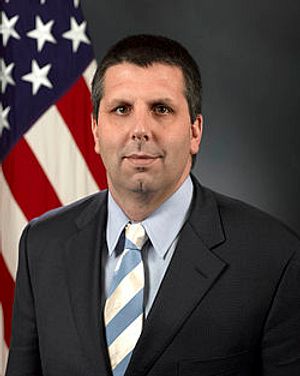A longtime key adviser to President Barack Obama may be appointed as the new ambassador to South Korea, according to reports in South Korean media outlets.
Earlier this week The Chosun Ilbo reported that Mark Lippert is a “strong candidate” to be the successor to outgoing U.S. Ambassador to South Korea Sung Kim, who is expected to leave his post early to become the new deputy assistant secretary of state for East Asia and Pacific Affairs.
Citing “sources in Washington,” the article said that Lippert had entered into White House discussions after the South Korean government asked that the next ambassador have direct links to the White House. Blue House reportedly made this request because it wanted someone comparable to Caroline Kennedy, who recently assumed the position of U.S. ambassador to Japan.
In terms of his closeness to President Obama, Lippert — who speaks Mandarin — would far surpass Kennedy. After serving in the office of numerous prominent senators, Lippert joined Barack Obama’s office as a foreign policy adviser in 2005, the same year that Obama became a U.S. senator. In 2008 he served as a foreign policy adviser on the Obama presidential campaign, as well as being on the transition team after President Obama’s November victory.
When Obama entered the White House, he kept Lippert close to him by appointing him as a key staffer to the National Security Council. Specifically, for most of 2009 Lippert served as the president’s Deputy National Security Director and National Security Council chief of staff. The latter position had been created solely for Lippert himself. In October 2009, however, the White House announced that Lippert had decided to return to active duty in the U.S. Navy. Previously, Lippert had served in Iraq.
It was widely speculated that Lippert had decided to leave the White House because of a feud he had had with then-National Security Adviser James Jones, who reportedly believed Lippert had been behind damaging leaks about him. Even after returning to the Navy, Lippert continued to receive a White House salary. When that came to light, a White House staffer told reporters that Lippert had never officially “detached” from the White House.
After returning from his naval deployment, Obama nominated Lippert to serve as the assistant secretary of defense for Asian and Pacific Security Affairs in October 2011. By then, Lippert’s supposed relationship with former NSA Jones had been so widely reported on that some members of Congress threatened to block Lippert’s appointment. These objections were later dropped and Lippert was confirmed in 2012.
Not long after Chuck Hagel became secretary of defense in early 2013, however, he named Lippert as his chief of staff. Still, Lippert reportedly excelled in building America’s defense relations in the Pacific during his short tenure as the assistant secretary of defense for the region. He has also received high praise for his work at his current position as the Pentagon’s chief of staff.
Thus, while Lippert doesn’t have as high as a profile as Caroline Kennedy or Max Baucus, who has been nominated as the U.S. ambassador to China, Lippert would provide Seoul with direct access to the president and the secretary of defense. Lippert’s appointment to a high level position in Asia would be similar to Obama’s decision to name former NSC Asia hand, Daniel Russel, as the assistant secretary of state for East Asian and Pacific affairs.

































